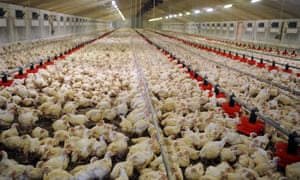https://www.theguardian.com/environment/2018/jan/13/animal-welfare-groups-call-for-higher-standards-for-farmed-chickens
Animal welfare groups call for higher standards for farmed chickens
Retailers and restaurants urged to sign up to new cross-European guidelines amid growing concerns over cruelty in intensive meat production
New welfare standards for farmed chickens have been demanded by a large coalition of European animal protection groups, including the RSPCA, in a bid to address growing concerns about inhumane conditions in the intensive and large-scale production of meat.
Supermarkets and restaurants are being urged to sign up to the new blueprint, which represents the first time a single set of requirements has been agreed on across the continent.
The complexity of the lengthy supply chain and ugly side of the chicken business was exposed last year when a Guardian and ITV News investigation into the 2 Sisters operation revealed workers altering food safety records for poultry processed at the firm’s plant in West Bromwich. The UK’s largest supplier of supermarket chicken temporarily shut the plant following undercover filming which also revealed poor hygiene standards.
To help curb some of the cruellest aspects of the business – which sees fast-grown, over-bred birds collapsing under their own weight – the new standard stipulates the use of higher welfare breeds. It also bans inhumane live bird shackling during slaughter, and specifies more natural light and space, room to perch and “enrichment” items such as straw and vegetables for pecking.
The authors of the pan-European guidelines are urging retailers and food service businesses across Europe to commit to raising welfare standards across their entire chicken supply chain by 2026. Marks & Spencer is the first retailer to have signed up to the higher standards.
Broiler chickens – those raised for meat only – are produced more than any other farm animal for meat, by far, with a staggering 950 million slaughtered each year in the UK alone, and 50 billion worldwide. This is expected to increase rapidly and by 2020 to become the largest meat sector in the world. Fast food chain McDonald’s, traditionally a beef-focused business, now sells more chicken than beef and expects that by 2020 it will source more than 10 times the volume of chicken it does at the moment.
“Despite rapidly growing demand, there has been little progress made in improving the welfare of the majority of chickens bred for their meat,” said Sophie Elwes, farm animal welfare specialist at the RSPCA. “The scale of suffering is substantial, including the use of fast-growing breeds which can contribute to painful conditions such as severe lameness and heart defects. This January it will have been 10 years since chicken welfare was highlighted by celebrity chefs Jamie Oliver and Hugh Fearnley-Whittingstall and sadly there hasn’t been as much progress as we hoped there would be.”
Oliver and Fearnley-Whittingstall’s two programmes highlighted housing, space and environment as important factors that compromise the welfare of chickens rather than the emerging issue of “turbo-charged” breeding and accelerated weight gain. The RSPCA says “genetic selection, especially that for fast growth, is likely to have the greatest impact on chicken welfare. It is also one of the biggest challenges to overcome, because fast-growing birds have changed the face of the industry and shaped consumer expectation for cheap chicken, with large yields of breast meat.”
Elwes added: “Retailers can often justify the selling of chicken reared to lower-welfare standards by citing … both ‘consumer choice’ and a range of price points, which in fact gives little choice to consumers on a budget other than to purchase intensively reared chicken.”
Recent polling by the RSPCA shows that eight out of 10 people (86%) who buy chicken expect the supermarkets to ensure that all chicken meat they sell is farmed to high welfare standards. Labelling may eventually be changed as a result of the new campaign, as in the UK currently only products labelled RSPCA Assured meet the new standard across all systems of production, eg indoor, free-range and organic.
Marks & Spencer head of agriculture Steve McLean said: “Animal welfare is at the heart of our business and we know how important it is to our customers. I’m proud of our record, however it is my responsibility to push the boundaries. We will therefore begin a series of trials in January designed to test the new standards and how they work in a commercial farming supply chain.”
Andrew Stephen, chief executive officer of the Sustainable Restaurant Association, commented: “This welcome consensus creates an opportunity for restaurants and the whole food service sector. We will be working to accelerate the sourcing and serving of meat from birds bred to these higher standards.”

沒有留言:
張貼留言